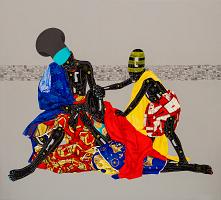PGDip Media & Communications
Content navigation menu
Why study PGDip Media & Communications at Goldsmiths
The Postgraduate Diploma in Media and Communications offers a broad look at many aspects of the media – sociological, economic and cultural. It invites you to think critically about the larger, global media worlds of the present age, and about your own place in society.
- This programme aims to provide comprehensive insight into the field of Media and Communications. You will explore the subject from an interdisciplinary approach, combining the two dominant perspectives that organise the field of inquiry. On the one hand, you'll discover the sociological or political-economy discussion of media institutions, with its characteristic emphasis on the social power of media organisations; and on the other, the domains of subjective identities in mediated societies, which draws more from the intellectual traditions of cultural studies. This will borrow from a range of different academic disciplines: sociology, anthropology, geography, psychology, literature and history.
- The School of Media, Communications and Cultural Studies has been ranked second in the UK for 'world-leading or internationally excellent' research (Research Excellence Framework, 2021) and 16th in the world (third in the UK) in the 2024 QS World Rankings for communication and media studies.
Gain a broad skill set
- You will gather the required specific skills and knowledge relating to studying media. However, the programme also allows you to engage more widely in critical thought, providing a broad and applicable skill set. The skills you'll gain will not only be appropriate for future employment within media industries but will also be applicable to many other areas of employment.
Varied learning opportunities
- The Postgraduate Diploma offers a range of teaching styles to aid your learning. You'll be guided to work independently from the outset, and encouraged to think through intellectual issues for yourself.
- To ensure your progress is carefully monitored throughout the course you'll be offered a range of seminars and different types of tutorials (with personal tutors and module leaders). This progression supervision includes an early, non-assessed essay to help to indicate your progress, and identify any ongoing problems.
- Your essays will require different kinds of theoretical input and different kinds of information-retrieval. In consultation with tutors, you will be guided to the most appropriate intellectual approaches, and to the most appropriate archives, libraries or electronic sources. Much of the initial work of trying out ideas takes place in the seminars, where you'll construct a dialogue with your classmates as much as with your tutor. Here you have the opportunity to learn how to present your ideas succinctly, to discriminate between different traditions of critical thought, and also to listen to other, perhaps competing, lines of argument.
- By and large the optional modules are taught by a mix of lectures, seminars and tutorials, although there are some variations. Some options offer a greater input of workshop organisation.
Support for your career
- The Postgraduate Diploma is primarily aimed at students who want to develop their skills or retrain. The Careers Service provides central support for skills enhancement, running The Gold Award scheme and other co-curricular activities that are accredited via the Higher Education Achievement Report (HEAR). The school has strong industry links and hosts a range of events that bring together industry experts, academics and students.
Contact
If you have specific questions about the degree, contact Lisa Blackman.
Length
1 year full-time or 2 years part-time
Entry requirements
Applicants will normally have, or expect to gain a first degree of at least second class standard (or equivalent).
School
What you'll study
You will study the following compulsory module:
| Module title | Credits |
|---|---|
| Introduction to Media and Communications Theory | 30 credits |
Full-time
The remaining 90 credits will be taken from the School of Media, Communications and Cultural Studies approved list of modules, which is published annually.
Part-time
Those studying part-time will take the same compulsory module and optional module/s worth 30 credits in Year 1. They will take optional modules worth 60 credits in Year 2.
Note about optional modules (if available): The above is indicative of the typical modules offered, but is not intended to be construed or relied on as a definitive list of what might be available in any given year. The module content and availability is subject to change.
How you'll be assessed
Taught sessions and lectures provide overviews of themes, which students are encouraged to complement with intensive reading for presentation and discussion with peers at seminars. Assessments build on lectures and seminars so students are expected to attend all taught sessions to build knowledge and their own understanding of their chosen discipline.
All assessed work is accompanied by some form of feedback to ensure that students’ work is on the right track. It may come in a variety of forms ranging from written comments on a marked essay to oral and written feedback on developing projects and practice as they attend workshops.
Entry requirements
Applicants will normally have or expect to gain a first degree of at least second class standard (or equivalent).
International qualifications
We accept a wide range of international qualifications. Find out more about the qualifications we accept from around the world.
If English isn’t your first language, you will need an IELTS score (or equivalent English language qualification) of 6.5 with a 6.5 in writing and no element lower than 6.0 to study this programme. If you need assistance with your English language, we offer a range of courses that can help prepare you for postgraduate-level study.
How to apply
Apply directly to Goldsmiths using our online application system.
Find out more about applying for a postgraduate qualification at Goldsmiths.
Fees and funding
Annual tuition fees
These are the PG fees for students starting their programme in the 2025/2026 academic year.
If your fees are not listed here, please check our postgraduate fees guidance or contact the Fees Office, who can also advise you about how to pay your fees.
It’s not currently possible for international students to study part-time under a student visa. If you think you might be eligible to study part-time while being on another visa type, please contact our Admissions Team for more information.
If you are looking to pay your fees please see our guide to making a payment.
Funding opportunities
Explore the Goldsmiths scholarships finder to find out what funding you may be eligible for.
Paying your fees
Find out about paying your tuition fees.
If you are a UK student you may be eligible for a postgraduate loan.
Find out more about postgraduate fees and explore funding opportunities. If you're applying for funding, you may be subject to an application deadline.
Additional costs
In addition to your tuition fees, you'll be responsible for any additional costs associated with your course, such as buying stationery and paying for photocopying. You can find out more about what you need to budget for on our study costs page.
There may also be specific additional costs associated with your programme. This can include things like paying for field trips or specialist materials for your assignments. Please check the programme specification for more information.





